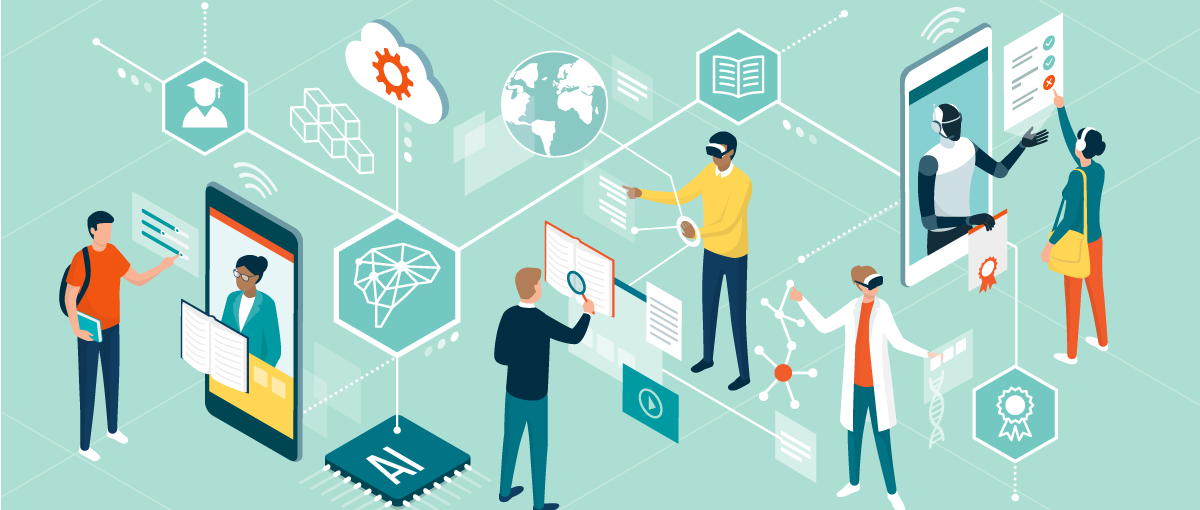
“I have no special talent. I am only passionately curious.” (Albert Einstein)
Curiosity is one of the main leverages for continuous improvement. However, it is not enough if you don’t have someone to guide you along a growth path. With this goal in mind, MIP Politecnico di Milano developed FLEXA, the online platform created with Microsoft and aiming to be a digital mentor for current MIP students and alumni, in order to create a path of professional growth that is as flexible as possible.
Thanks to the work of Artificial Intelligence, FLEXA offers:
- A hard skills self-evaluation
- A soft skills assessment
- A digital skills assessment
- The possibility to insert your career goals
- The chance to define the daily/weekly amount of time you want to dedicate to your improvement.
The user starts by defining the areas in which he/she wants to grow. After an evaluation, the platform allows the user to identify the gaps and the content necessary to be able to fill them.
Another important component is the time that the user has available for his/her training (“time is money”, they say). The content provided and the growth plan, in fact, consider the weekly hours that can be dedicated to studying and the period within which you want to obtain results.
With only these two pieces of information, FLEXA will provide you with plenty of materials, webinars, articles, events and videos from which you can choose to boost your knowledge.
Let’s talk about the self-evaluation. Is it truly easy to do? Apparently yes, but it’s not.
It takes time to properly evaluate your own level of knowledge. If you do it in a superficial way, you risk either overestimating or underestimating yourself, falling into the Dunning-Kruger effect.
“The fool doth think he is wise, but the wise man knows himself to be a fool”, wrote Shakespeare in As You Like It. And that’s the essence of the Dunning-Kruger effect, according to which those individuals who are least capable in a particular area of knowledge are most likely to overestimate their capability.
Only with experience can you properly get to understand which is your true level of competence.
The Dunning-Kruger effect makes you understand how important it is to fully comprehend your strengths and, above all, your weaknesses. Yes, because you must work hard on these weaknesses to improve yourself and to become an all-round professional.
Aristotle, one of the most famous philosophers in history, was convinced that “Knowing yourself is the beginning of all wisdom”. And the “beginning of all wisdom” can’t be that easy, can it?
Starting to do a good evaluation of yourself and your competences is the first step towards setting the best path for career growth. So, before beginning FLEXA’s skill assessment, try to focus on yourself. With a digital tutor it is even easier to be honest and admit your weaknesses.
This test will also be a good chance to focus on the main skills you’d like to improve and on the aspirations you have in the long term.
In the Hard Skills section, you’re encouraged to reflect on yourself and the technical skills you have acquired to date. Through a self-assessment, you will be asked to define your level of knowledge of each of the complex skills that, based on the benchmarking, are generally required to operate within the functional area of your choice.
The Soft and Digital skills sections are a little different and are evaluated through a bunch of multiple-choice questions.
At the end of the set of assessments you will be offered feedback, based on which you will be given a guide for the development of the level of your skills. The top critical skills to be developed for each set of skills (hard, soft and digital) will be highlighted as follows:
during the time, FLEXA will show your progress in each of the three fields of skills. From my point of view this is really helpful, and quite motivating. Having continuous feedback on how much you have improved and the great results you have achieved can be a huge incentive to keep on learning.
So, in order to stay curious, as Einstein said, why not give it a try and start your FLEXA Journey? Go to https://www.flexa.polimi.it/en/ and log in with your MIP email. For any questions or need of support, you can contact the FLEXA Support team by writing to flexasupport@mip.polimi.it.
About the author
|
|
Marco Di Salvio
Student of the International Part Time MBA at MIP Politecnico di Milano. |







